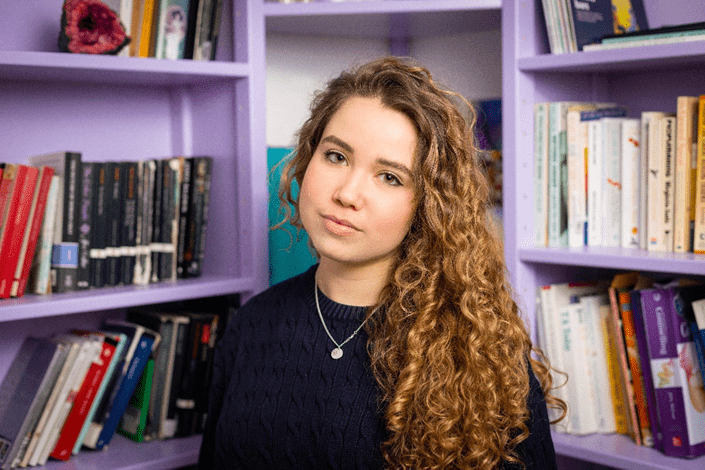
The Therapy of Writing: An Interview with Author Jemima Atar
Having emerged on the literary scene only two years ago, Jemima Atar already has a bestselling book to her name and a reputation for delivering thoughtful, enquiring, and healing writing which draws upon her training as a psychotherapist. With Jemima currently working on her debut novel, Pourquoi, we spoke to the rising author to find out more about her work and future plans.
Q. As a trainee psychotherapist, and the significant study that involves, what keeps you motivated to write?
A. I would say that the byproduct of studying psychotherapy is a big inspiration and motivation for my writing. In addition to learning psychotherapeutic theory, training in psychotherapy involves a lot of self-reflection. It is, by nature, a field in which the therapist’s personal development greatly influences how effectively and genuinely they can meet a client ‘where they are at’. And so, whenever I’ve made a new discovery about myself, I’ll think of a way to incorporate it into my writing, and vice versa: whenever I’ve written about something that applies to me, the act of writing solidifies my self-discovery, thereby benefiting my work with clients, too.

Q. What do you find most rewarding about your career as a psychotherapist?
A. Witnessing transformation in my clients is incredibly rewarding, especially when clients can see for themselves how far they have come. Whether it’s growing in their self-awareness, stepping into their journeys of healing, piecing together confusing and fragmented narratives, learning to live more content lives, having healthier relationships, or moving closer towards their goals, the work that I’ve watched my clients undertake throughout the therapy process is impressive and moving — hence, very rewarding for me, too.
Q. Many leading professionals will, at one time or another, seek the support of a psychotherapist. What advice can you give them in finding the best therapist for their needs?
A. Be aware that it might take time to find the right therapeutic fit. It’s important to take into account that our therapeutic needs are all unique, and so are our preferences, likes, dislikes, beliefs, and ways of working and learning. As such, professionals should be prepared to try out a few therapists until an appropriate match is found. Some questions to ask oneself might be:
- Do I feel that I could connect with and trust this therapist?
- Does this therapist work in a way that fits my needs?
- What do I want to get out of therapy, and is this therapist qualified and specialised in those areas of expertise?
- Will the practicalities work out: does this therapist work in person or online, what are their fees, where are they located, and what are their working hours? How does all of that fit with my preferences?
It might take a bit of time and effort before everything comes together and a suitable therapist is found, but it’s usually worth taking that time so that the maximum benefits of therapy can be felt.
Q. Your books cover themes of mental health, though from an artistic framework. What is the attraction to you of doing this, both as a mental health professional and author?
A. From a mental health perspective, using artistic channels to explore issues of the psyche can really help with the understanding and expression of suffering. Writing, at least for me, is a safe canvas upon which I can project, play with, and get to know my emotions and my experiences. Spending time trying to find the right words can help sort through jumbled internal narratives that often require creative approaches to unfold. And as an author, I find that mental health includes wide-ranging themes that are very rich and complex, which make for great literary explorations. The intersection between mental health and artistic expression can be considered from so many different angles, and having a constant stream of ideas that keep flowing from this abundant intersection can be very satisfying for an author.

Q. Your first book, memoir Grief and Her Narrative, deals with an unusual and little-spoken form of loss. Can you explain more, and why you felt the subject important to set down in print.
A. My memoir is about the grief that characterises suddenly losing a therapist. It is based on my own personal experiences. My therapist had to suddenly terminate sessions after almost two years, and I found myself thrown into a kind of grief that was unfamiliar, lonely, and not often talked about. The memoir is about the continuation of my narrative without my therapist, with the grief process acting as ‘the main character’ of the book, leading the way towards healing. I felt that this was important to write about as I didn’t see many available resources discussing this topic in depth during the time it happened to me, yet I discovered, through my own research, that many clients had been through similar experiences of sudden therapist loss. Essentially, writing the memoir was part of my own healing journey, and simultaneously, I hoped to help others in similar situations who might also find themselves needing support and validation.
Q. Your second book, bestselling poetry collection you are safe now, is themed around the trauma of sexual abuse, drawing upon your own and other survivors’ experiences. This must have been a challenging book to write but what are you most proud about this work?
A. I am most proud of the honesty in you are safe now. Throughout the process of writing, there were many times when I debated whether to remove some of the more explicit poems, to add some ‘happier’ poems, or even to change the entire collection to either solely describe trauma or solely describe healing. I am glad that I chose to stick with the truth, neither anaesthetising it by shying away from the harder realities nor choosing to focus on one half of it at the expense of the other half. I am a big believer in authenticity, and by highlighting the difficult duality of both suffering and healing in my work, I’d like to think that I was honest with myself and with my readers, and this makes me proud.

Q. You are currently working on your first novel, a work of literary fiction titled Pourquoi. What gave you the idea for the book’s intriguing premise, involving the ethically questionable blurring of lines within a therapeutic relationship?
A. The idea was primarily born out of my engagement with my psychotherapy studies. We were frequently provided with case studies and vignettes made up of ethically ambiguous scenarios during training, and were told to unpick them and discuss them amongst ourselves. Pourquoi was an attempt at creating a live version of such ethical debates, using fictional characters and a dynamic interplay between the two of them to bring to light various nuances of their questionable relationship.
Additionally, I’ve always been fascinated by the growth and learning that occurs when people can share their unique life experiences with each other. This inspired me to create an extended scenario whereby two characters actively talk about their interesting similarities and differences, allowing them to position themselves against one another and learn more about themselves.
Q. The novel is focused around therapist Cameron and his deepening relationship with his client, associate university lecturer Delphine. What fascinates you most as an author about their interplay?
A. As an author, I found it breathtaking to watch Cameron and Delphine’s interplay take on a life of its own while they acted out their psychodrama, as though I, the creator of these characters, could just sit back and watch their story unfold once I had set the basics of their dynamics in motion. The way the two took over each other’s roles — whereby Cameron acted as therapist in the first half of the novel and Delphine assumed this position while Cameron’s personal struggles emerged in the second half — is one example of this autonomous ‘acting out’ that I didn’t intentionally plan or foresee. Given that Pourquoi is my debut fictional novel, I hadn’t experienced this kind of phenomenon in my writing before, and I was really fascinated by how it felt to be an outsider to my own characters!
Q. Having previously penned a memoir and poetry collection, why did you choose the genre of literary fiction for your current writing project, Pourquoi?
A. The use of the literary fiction genre was less of a choice that I made from the beginning but, rather, a retrospective acknowledgment that the novel I had written could best be placed into the literary fiction category. Initially, before starting the process of writing Pourquoi, all I knew is that I wanted to create a story consisting of only two characters, with a heavy focus on their dialogues, internal thought processes, and character development. I had a feeling that Pourquoi would deal with difficult topics, and would be introspective in nature. When I then began incorporating these ideas into a plot, I realised that my work was one of literary fiction. Perhaps it would be best to say that this particular genre chose Pourquoi, not the other way round!

Q. Can readers expect you to continue your exploration of literary fiction or will you seek another genre with your next book?
A. As was the case with Pourquoi, my ideas tend to emerge first and the decision as to which genre my writing fits into comes second. Given that I am led by my inspirations in this manner, I am open to writing in whichever way works best with my ideas. However, I am interested in experimenting with many different genres, especially ones that I haven’t used before. I’m also curious about writing with new, creative techniques, perhaps utilising similar genres that I have already dabbled in, but in different ways; for example, writing a graphic novel.
Jemima Atar is the author of Grief and Her Narrative: A Memoir of Sudden Therapist Loss and bestselling poetry collection you are safe now, both of which are available on Amazon.co.uk. Visit Jemima Atar: Her Website or follow Jemima Atar on Twitter: Jemima Atar (@JemimaAtar) / X





